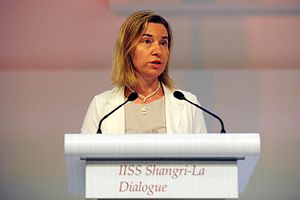Earlier this week, the European Union and Vietnam officially announced a number of steps to further deepen their security and defense partnership. While many of these developments were expected, they nonetheless highlighted the efforts by both sides to further strengthen their security ties amid shared priorities and outstanding challenges.
As I have noted before in these pages, though Vietnam has long had ties with select European states, ties between Hanoi and the European Union (EU) as a bloc have gotten greater traction over the past few years, with a Partnership and Cooperation Agreement signed in 2012 and taking effect in 2016 laying the framework for the relationship.
As this has occurred, there has also been a focus on opportunities in the security realm for both sides in areas such as peacekeeping in spite of challenges which include Vietnam’s human rights record and Europe’s stretched defense capabilities given its existing obligations. This occurs in a broader context where Vietnam is looking to strengthen its ties with major powers and the EU is eying a stronger security role in the Asia-Pacific.
That has continued on into 2019 as well. Both sides have been discussing not just interactions such as individual trips and visits by naval ships of EU countries to Vietnam, but also potential advances in the overall defense relationship such as Vietnam becoming an EU official partner on defense cooperation through the inking of a Joint Vision Statement on Defense and a memorandum of understanding on bilateral defense cooperation between the two sides.
This week, the defense aspect of the relationship was in the headlines again with the visit of Federica Mogherini, the High Representative of the EU for Foreign Affairs and Security Policy and Vice President of the European Commission, to Vietnam. Mogherini was in Vietnam for a pre-planned visit following her participation at the ASEAN Regional Forum and the EU-ASEAN Post-Ministerial Conference in Thailand, and while her visit was wide-ranging, both sides also announced some key steps on the defense side of the relationship as well.
The steps were announced around what was officially characterized by the EU as a “defense and security cooperation partnership” following a meeting between Mogherini and Vietnam’s Defense Minister Ngo Xuan Lich. Under that banner, most of the headlines noted the conclusion of negotiations on framework participation agreement (FPA) that would facilitate greater Vietnamese involvement in crisis operations. To be sure, that agreement is in of itself quite significant. It gives the EU its first partner in Southeast Asia of this kind, providing yet another concrete example of how it is trying to translate the potential for defense collaboration into reality in the subregion. A a more practical level, an FPA agreement opens the door for operationalizing EU-Vietnam security cooperation in areas such as peacekeeping and conflict management.
But beyond that, both sides announced other steps as well as part of a deeper defense and security cooperation partnership. According to a statement released by Vietnam’s defense ministry, these included the signing of a memorandum of understanding that would facilitate the EU sending peacekeeping experts to Vietnam for assistance as well as a commitment to regularizing more defense consultations between the two sides which has long been a key agenda item. Significantly, both sides also underscored the wider context for their deepening security partnership, including the shared challenge of cyber security as well as freedom of navigation, a point that Mogherini specifically referred to in her press conference with Vietnam’s Foreign Minister Pham Binh Minh as well in the wake of the recent tensions between Hanoi and Beijing in the South China Sea.
To be sure, it is early days, and a lot is still unclear about how this deeper security collaboration would translate into reality. Until we see concrete new cooperation take shape in the coming months as more specific defense-related visits and engagements occur, it is difficult to evaluate how exactly this defense and security cooperation partnership is actually manifesting in an actual upgrading of tangible cooperation.
It is also important to keep in mind the complex, broader context within which stepped up defense ties would operate in. Both sides will be heading into a busy few months as well in their foreign policies, whether it be Vietnam’s busy year for foreign policy in 2020 as it holds both an ASEAN chairmanship and the nonpermanent UN seat, or broader flashpoints such as the South China Sea and continued U.S.-China tensions that preoccupy officials in Hanoi and Brussels. Furthermore, there still continue to be limits on how far both sides can push security collaboration due to a range of issues tied to their capabilities, wider array of foreign alignments, and the differences in domestic systems. Indeed, to seasoned observers, is no surprise that many of the measures announced by both sides this week have taken much longer than intended to be operationalized, and that they were carefully messaged when they occurred.
These developments and more will continue to provide a complex context for the advancement of a EU-Vietnam defense and security cooperation partnership. And it will take material resources and political will by officials on both sides to carefully manage both the opportunities and challenges within that partnership.

































